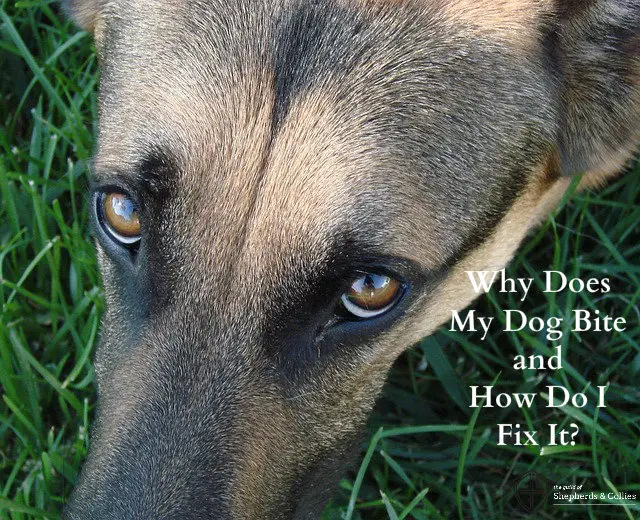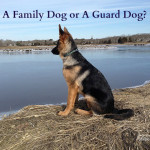Does Your Dog Bite? Here’s Why and How to Stop It
Why Did My Dog Bite, and How Do I Stop It From Happening Again?
“Good dog! No bites!” If you ever have the chance to welcome a new dog into your home, you’ve probably uttered those words. Teaching your dog not to bite – even in fun – is one of the first and most important steps in dog training.
The first time we had a dog, I remember standing on the couch with my then two-year–old son while those sweet little doggy eyes looked up at me - with his sharp little puppy teeth clinging to my son’s sweatpants! He obviously didn’t know the difference between play and bad manners, and we were too inexperienced to know how to stop him. Fortunately, all it took was a puppy obedience class to set us both on the right track.
Hopefully this has never happened to you, but we’ve all heard dog bite horror stories. Some had happy endings. Some not so much.
According to the American Veterinary Medical Association (AVMA), roughly 4.5 million Americans are bitten each year by dogs, and 20 percent of them need medical care as a result. Another site tracking statistics (which we won't link here, because we at Guild of Shepherds and Collies don't agree with their view that specific breeds should be ostracized, even if they're not herding breeds) reports that almost half of those cases are children under 13, and seniors account for almost two-thirds of the remaining adults. So what’s a dog parent to do?
Well, first of all, it helps to know the reason why a dog bites. Here are the top reasons a dog bites:
- Fear – Especially of new people, loud noises, or things unexpected.
- Guarding a resource – Dogs tend to value certain “resources” they consider to be theirs. When someone gets too close to a dog’s food, bones, treats, or toys, the dog may growl or even bite to protect the item.
- Pain - If a dog is in pain, he may react more aggressively if he’s startled or touched in a sore spot.
- Maternal instinct – New mamas often feel protective toward their pups.
- Love of the chase – Even gentle dogs can sometimes become excited when a biker, runner, or squirrel zoom past; it’s pure canine instinct to chase that moving object.
- Owner temperament – Forceful discipline, loud, and intimidating or threatening behavior directed toward your dog can make the dog react aggressively.
- The dog’s breed – There are those who believe that inherent traits related to certain breeds may cause those dogs to bite -- and that’s definitely a valid view to explore. But nurture can often trump nature if they these pets are raised in a loving, caring home.
- And, of course, herding instinct! – Our herding breed pals sometimes tend to nip. It's not an attempt to hurt, but to herd. Some styles of herding instinct involve nipping at the heels of the livestock they are controlling, and that can sometimes manifest itself by nipping at fast-moving people (like running children) who are triggering the dog's herding instinct.
The first step of bite safety is doing whatever you can to prevent bites from ever occurring. Many people simply love dogs and children, especially, may approach a dog with unbridled enthusiasm – which can startle a dog, frighten him, or send him into protective mode. In short, the dog may bite because they feel threatened.
To avoid this canine response, you or your children need to adjust your own behaviors.
- Be polite– don’t pet or approach a dog that’s unfamiliar, alone, tied up, or inside an invisible fence.
- If a dog is with its owner, ask if it’s OK to pet them.
- Never try to pet or play with a dog that’s eating.
- Don’t take a toy or bone from an unfamiliar dog.
- Let them sniff you before touching them.
- Watch for specific signs that a dog may be fearful or aggressive – ears back, body tense, teeth barred, penetrating stare, or backing away. These are signals that he or she is uncomfortable and may become hostile if approached.
- Don’t run – stand still, with your hands at your sides and do not make eye contact. If the dog starts to relax, back away slowly.
- If the worst happens and a dog does attack, try distracting them with your coat, gloves, backpack, etc. And if that doesn’t work, curl into ball, protect your face and head, and stay as still as possible.
Many people assume that stray dogs are the ones most likely to bite, but the “For Kids’ Sake Safety Around Dogs Program” reports that it’s actually family pets. Half of the time, bites occurs in the dog’s own home or other familiar area. And you might be surprised that their targets are also usually people they know – children, grandchildren, neighbors.
As you can see by the list above, there are many reasons why a dog might bite – and aggression isn’t always the cause. Many times it’s because they’re nervous or confused and the bite is the canine version of “self-defense.” They don’t mean any harm, but a dog is a dog – and he or she usually has big, strong, sharp teeth, so intent doesn’t really matter. Biting is serious – and it needs to be nipped (pardon the pun) in the bud before it happens again. So what should you do when you have a good dog “gone bad?”
Well, how you react can make a world of difference. There are some things you can do at home, but sometimes you may need to consult your vet or an experienced dog trainer. In addition to the reasons mentioned above, your vet can give your pup a thorough physical exam to find – or rule out – any medical problems they may have. Some conditions, including orthopedic problems, cancer and seizures, can cause a dog to react aggressively. And in addition to physical problems, cognitive issues (especially in older dogs) and certain medications may cause confusion and anxiety, which could ultimately lead to nervous snapping or biting.
If your vet rules out a physical source, you should consider working with an animal behavior expert. A professional can help you determine the cause of the biting and whether the behavior can be successfully treated. If so, they can create a treatment plan targeted to your dog, your family, and the trigger behind this conduct.
Depending on the nature – and reason for – the bite, behavior modifications and safety precautions are all you’ll need. You won’t necessarily need to get rid of your pet.
Your initial reaction may be to punish the dog. While you certainly don’t want to praise or “comfort” them, aggressive or physical punishment is the last thing you should do – it may end up reinforcing their own show of aggression and causing more harm than good. Remove them from the scene to a safe, calm area and eliminate any opportunity for it to happen again.
- If your dog bit your grandchild because she got in his face, for instance, don’t allow them to be alone in the same room again.
- Don’t let your dog outside without being on a leash.
- If your dog has been aggressive to visitors, stand between him and the door when you open it.
- Don’t allow guests to pet a dog that has bitten someone. Put the dog in a different room or outside (weather permitting) when you have company.
- If your dog is aggressive with other dogs, keep him on a tight leash and warn other dog-walkers. Cross the street when you see other dogs and walkers approaching.
- Practice behavior modification. Watch for your dog’s triggers - whether it’s men, children, loud noises, other animals, etc. – and slowly introduce the ones you can’t avoid (your husband) and reduce or avoid the ones you can (sudden noises).
- If all else fails, consider rehoming the dog to a place where he won’t encounter these triggers (e.g. other dogs or children).
No one wants to even consider this possibility, but occasionally the victim of a dog bite will require medical care for the victim -- and a police report of the incident. A word of advice – file it yourself. This will show your desire to be honest and attempt to do what’s right. (It also allows you to present your side of the story.) Have the dog’s vaccinations up to date and the veterinary paperwork available. Also, contact your insurance company. Homeowner’s insurance may cover at least part of the expenses.
The cause and severity of the bite will most likely be the determining factor in what you do next. If you love your pet, the best thing you can do is take this seriously. Don’t resist working with a dog trainer (or pet therapist) due to embarrassment. And don’t let a guest pet your dog the next day just because she says, “Oh – he knows me!”
Your dog may still be the loving and affectionate pet you’ve always known – around you. But it will take some time – and work - to keep both the dog and others safe. Don’t take chances with either one.
Article By:
Sue Sveum







